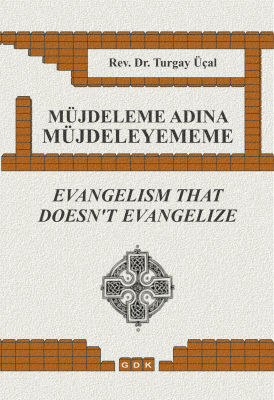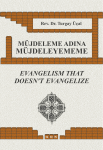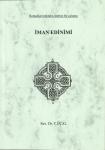It is generally very difficult for any of us to look at ourselves objectively. Particularly when we receive criticism real maturity is required to determine the validity of statements made about us. In attempting to discern this, our Lord Jesus’ teaching to examine first the log in our own eye is very important for any follower of Christ seeking to heed his words (Mt.7:3).
Jesus Christ’s gospel of salvation is of course meant for all humankind. Unfortunately however, the human tendency to distort any given reality has also affected our understanding of the salvation and teachings of Christ to a certain degree. His salvation and teachings have been taken beyond the bounds of their intended purpose. What people see around us today as “the Church” is many institutions with different ideas of faith, worship, and opinions about “the Church.” Even at first glance, they are confronted with significant walls surrounding our Maker’s glorious gospel of salvation in Christ.
The gospel, as the divine hand of salvation in the simplicity and transparent character of Jesus Christ, developed especially in the first few centuries as a heart-changing movement among religious Jews tightly tied to their traditions. Their places of corporate worship where worshippers could discuss spiritual matters were very conducive to the growth of the gospel among these Jewish believers. Further, their ability to act collectively as a family and a society and to trust each other due to their common background of Jewish teachings played a significant part in the growth of the Christian faith among them. Later however, when people of many different nations started to accept Jesus Christ as the Lord and Savior this unity started to become strained to different extents in different parts of the world. This soon resulted in disputes among opponents within the same faith over whether they could accept each other as brothers and sisters in Christ.
As a result, while trying to find harmony among themselves, the people who were trying to adapt themselves to the teachings, way of life, and salvation in Jesus Christ’s gospel slowly started adopting new views originating from human opinions and tied to the traditions of their time. They started to develop different practices and even put forth different confessions of faith and creeds and began to defend the truth of their own interpretations. It was during this period that Jesus Christ’s authentic foundational principles started to erode through the influence of empires, civilizations, cultures, and languages.
This continued through the 16th and 17th century Reformation movements, until which time Europe had continually suffered from war and unrest. After these religious and political struggles had calmed down to a degree, some Protestant Christians, realizing the opportunity, started missionary movements to establish their beliefs among others.
Through these missionary movements another institution developed within the already institutionalized church. They called themselves “para-church,” depending upon their size and development, and often acted independently of churches and sometimes declared their independence from churches. At times, these organizations even proved to be more effective than churches. Though present and developed within the Roman Catholic Church these relatively recently established para-church organizations and today’s Protestantism go almost hand-in-hand with mission organizations. As for some Western or Eastern Orthodoxy, with most of their churches in the grip of their country’s nationalism and trapped inside of a religion-nationality-culture triangle, they began to focus on their own internal affairs and developed a monopoly mentality (somewhat similar to that of Judaism) toward the universal message of Christ Jesus.
Now the 21st century has virtually brought about a whole new world empire. While the world is still continuing to globalize, technology puts the most distant places right in front of us. Some religious institutions and organizations, with the boldness they gain from their countries’ position as global powers holding the lion’s share of the world’s prosperity, are aiming at a global religious movement that goes beyond our Lord Jesus’ concept of the church. It is interesting that most of these organizations are from Protestant groups that raise the flag against the Pope. Whether they realize it or not, each different organization has formed its own pope. According to the members of each organization the most effective and doctrinally correct ministry is offered only by their individual pope.
After the period of Jesus and his apostles the Church’s history developed largely outside of the Middle East. In particular as it developed in the West the Christian faith today has gone far beyond Jesus’ life, teachings, and gospel of salvation. So the Christian faith today reflects the West’s religious understanding and conception of spirituality.
Under these circumstances, since the basics of the faith developed in Jesus’ time, whether or not one wants to accept this the issue of a “fifth gospel” is at hand. In a sense, many of today’s dominant Christian denominations believe and live by this “fifth gospel.” This so-called “gospel” falls far from the good news of Jesus Christ, which is plain enough to be understood by all people and makes no distinction between people based on language, race, or culture. If we see the modern, industrialized world as an empire this fifth gospel can be seen as a “Gospel of the Empire” that has been formed in the hands of the powerful. This gospel should not be understood as a written text along with the Scriptures. It is like a pair of eye glasses that create a particular perspective, understanding, and interpretation while looking at the Scriptures, while studying Jesus’ teachings, and while proclaiming the gospel. To be able to understand these glasses, the history of the West must be evaluated. So besides Jesus’ point of view and the perspective he taught, there are now various assessments among those who evaluate his perspective, and there are different perspectives giving direction to his teachings. This is all to say that what we know of the teachings and identity of Jesus Christ has been greatly affected by a tremendous amount of water under the bridge between the time of his ascension and our own day.
Consequently, when this understanding and experience of the gospel are combined particularly with the individualism and the self-centeredness of our day, the saving message of Jesus Christ is completely abandoned such that what remains only resembles the reality, and in the background egos clash and denominations collide. Unfortunately this, as well as a concern to elevate one’s own culture and nationality, has been presented to humanity and the world as Christianity.
At the same time the world, which can no longer see, hear, or feel the faith of Jesus in its pure form and the gospel in its actual, simple authenticity is always apprehensive at the approaches of these kind of organizations and institutions and often tries as much as possible to keep its distance from these kind of organizations.
As for sincere followers of Jesus, though they come from different denominations and different countries they are aware of all this and through their sincere prayer, worship, and faith are trying to live and reflect the authentic gospel as much as they are able. As those producing fruit, we can know for certain that they will eventually be rewarded by the LORD and will even receive great reward from fellow believers and neighbors around them. In the same way, those who use the name of the gospel without giving the good news will eventually receive due payment for their actions. When we look at history we see many who have received their due.
We hope our short assessment with the goal of “seeing the log in our own eye” (Mt.7:3) will bring us a little closer to Jesus’ authentic gospel and lead us a little more toward being “light,” as he is, for all of humanity.












Yorumlar
Var - http:/
Türkçe versiyonu yok mu?
Yeni yorum ekle